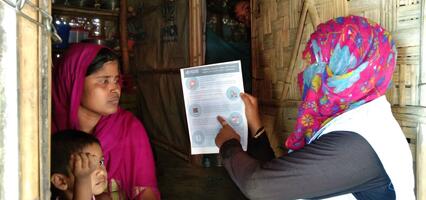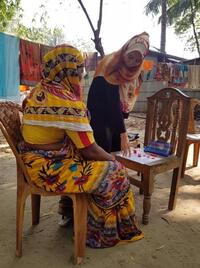 Changes in religious gatherings and practices to curb COVID-19
Changes in religious gatherings and practices to curb COVID-19
July 2020
A representative phone-based follow-up survey to the Cox’s Bazar Panel Survey (CBPS) conducted in April 2020 collected information on the prevalence of COVID-19 symptoms, risk factors, and health behaviors in host and refugee communities in Southern Bangladesh. Despite widespread knowledge of COVID-19 and of the sources of transmission, attendance at religious gatherings is high, even after the imposition of lockdown restrictions in early April. This pattern of behavior represents a potentially important pathway for disease spread in refugee camps and host communities in Cox’s Bazar. When asked about trusted sources of advice on COVID-19, both hosts and refugees identified friends, acquaintances, and community leaders – including religious leaders – as important, putting them in front of other trusted sources of information including family, relatives, and informational campaigns.
We complement the information gathered in the phone survey with a separate survey of Imams from around Bangladesh. We find considerable willingness to make changes to their practices in some way. And yet, some important and potential effective measures, including discouraging attendance of the elderly, removal of the communal prayer mat, and postponing congregational prayer, remain uncommon. Given the trust placed in religious leaders, potentially effective policies should try to recruit Imams and religious leaders to convince them to foster effective measures, such as decreasing prayer gathering sizes, reducing frequency of prayer attendance, and disseminating public health and social distancing advice.
 Effective channels for COVID-19 communication and treatment in Cox’s Bazar
Effective channels for COVID-19 communication and treatment in Cox’s Bazar
July 2020
Using a representative sample from a phone-based follow-up survey to the Cox’s Bazar Panel Survey (CBPS) in southern Bangladesh in April 2020 reveals: i) gaps between COVID-19 awareness and protective behavior, and ii) the primary sources of health information and treatment that constitute promising targets for interventions among Rohingya refugees and host communities. The vast majority of refugees and hosts are knowledgeable about respiratory hygiene and potential sources of virus transmission. However, many continue to leave home regularly, suggesting that mere awareness of COVID-19 risks is not enough to ensure behavioral change in accordance with public health recommendations. New campaigns must encourage people to seek treatment and highlight the importance of protective measures via trusted sources. Local pharmacies, friends, and the media are the most effective channels for COVID-19 communication and treatment in Rohingya refugee camps and surrounding host communities. Given the significant remaining uncertainties, continued research and innovation will be required to achieve the community-level adoption of protective behavior needed to overcome the pandemic.
Socio-Economic Characteristics of Rohingya Refugees from Myanmar Living in Bangladesh
April 2020
In line with the 2018 Global Compact for Refugees commitment to promote economic opportunities, decent work, and skills training for both host community members and refugees, this brief presents a set of stylized facts on the socioeconomic status of Rohingya refugees in 2019 and in the year preceding the latest outbreak of violence which saw the largest and fastest refugee influx in Bangladesh’s history.
The aim is to better understand the ways in which the challenges faced by Rohingya refugees while they were living in Myanmar are likely to affect their ability - and the ability of future generations of Rohingya - to attain a better living standard in their host communities, with a view to informing policy and programming.
The results are based on the Cox’s Bazar Panel Survey (CBPS), an in-depth household survey covering 5,020 households living in both refugee camps and host communities. This quantitative data collection is complemented with qualitative interviews with adolescents and their caregivers. This is a joint collaboration with researchers from Yale University, the World Bank, the Gender and Adolescence: Global Evidence (GAGE), and IPA-Bangladesh for data collection.
 The Impact of Large-Scale Forced Displacement on Rohingya Refugees and Host Communities in Cox’s Bazar, Bangladesh
The Impact of Large-Scale Forced Displacement on Rohingya Refugees and Host Communities in Cox’s Bazar, Bangladesh
December 2019
Despite the scale and persistence of forced displacement, little data and evidence exists to inform long-term policy responses. The arrival of hundreds of thousands of refugees in southern Bangladesh beginning in August 2017 poses a significant policy question: how to integrate refugees into the host economy while simultaneously maintaining or improving the wellbeing of nationals. Researchers are working with IPA to collect detailed social, economic, and health data from previously arrived refugees, recently arrived refugees, and Bangladesh nationals in southern Bangladesh to explain the impact of the recent large refugee flow on the host economy.
